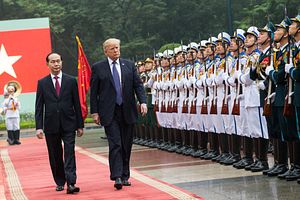After quite a considerable delay, the Trump administration released its first National Security Strategy (NSS). Despite the criticisms of the NSS as isolationist, it does contain sections indicating the administration’s policy toward different regions, including Southeast Asia.
At first glance, there appears to be nothing much in this 2017 NSS regarding Southeast Asia. The NSS simply stated its position toward Southeast Asia in one small paragraph, under the section “Indo-Pacific.” Under this section, it states that countries such as Thailand and the Philippines remain “important allies” while others like Vietnam and Singapore are classified “growing security and economic partners.” This presents a vague picture, compared to the Obama administration’s 2015 NSS or the 2010 NSS, both of which provided greater detail on the U.S. approach to Southeast Asian nations.
The rest of Indo-Pacific section presents a general picture of U.S. interests, for example, freedom of navigation, trade agreements, and the rule of law. All these statements aren’t unique; many of which were in much greater detail in Obama’s NSSs, George W. Bush’s 2002 NSS and even Bill Clinton’s last NSS. These previous National Security Strategies have provided greater detail on these various ideals in U.S. foreign policy than the latest one.
The 2017 NSS not only presents a vague idea of U.S. policy toward Southeast Asia but also puts forward haphazard proposals and ideas, some of which contradict the Trump administration’s actions throughout 2017. For example, under the “Economic Diplomacy” section, the 2017 NSS states that it aims to expand America and its allies’ wealth through free markets and fair trade. This is juxtaposed with a section accusing the past U.S. administrations and trading partners of unfair trade practices without any concrete evidence and it includes threats of economic “enforcement tools.” This is more aggressive than what was announced by Trump earlier in 2017, stoking fears of an isolationist U.S. trade agenda.
With respect to Southeast Asia, the Trump administration’s withdrawal from the Trans Pacific Partnership (TPP) added further uncertainty and indicated that the United States would abdicate its economic dominance from the region. Trump’s NSS appears to soften this stance by proposing bilateral trade agreements, but Southeast Asian countries have to wait in the dark for more detail. Even Singapore, which concluded a Free Trade Agreement (FTA) with the United States during the George W. Bush administration, was disappointed with the U.S. withdrawal from the TPP.
Another contrasting topic between the vision of the 2017 NSS and Trump administration’s policies is that of wider U.S. diplomacy. Under the section “Diplomacy and Statecraft,” the 2017 NSS argues for “competitive diplomacy,” championing upgrades to U.S. diplomatic facilities, as well as U.S. diplomats forging trustworthy coalitions and leading by example. This statement is contrasted with the Trump administration’s budget, which severely reduced the State Department’s funding and curtailed U.S. foreign aid operations. Trump has only just appointed an assistant secretary of state for East Asian and Pacific affairs; other key posts — such as ambassador to the Association for Southeast Asian Nations (ASEAN), State Department officials covering global issues and some ambassadors to individual Southeast Asian countries — remain vacant or temporarily filled. So far, Trump has appointed a USAID administrator, but the posts of USAID assistant administrators are still vacant or filled by acting assistant administrators. The Millennium Challenge Corporation (MCC), the U.S. agency providing aid to countries that meet good governance standards, is another key agency without a confirmed leader. For Southeast Asian nations, especially those with low-income and developing nation status, this would mean weaker access to U.S. aid or advice.
The 2017 NSS lists international development as its fourth pillar. Interestingly, the NSS mentions that the United States will “modernize its development finance tools so that U.S. companies have incentives to capitalize on opportunities in developing countries.” In contrast to U.S. aid provided through grants, the Trump administration will apparently focus more on directing private financial flows to aid countries. This sort of financial assistance is not new to Southeast Asian recipients; the question is how active the Trump administration will be in improving economic development in Southeast Asia.
The fourth pillar in this new NSS also describes how the Trump administration will approach multilateral organizations and partnerships. As with the sections on economic activities and diplomacy, the NSS posits a reciprocal relationship, aggressively warning allies that they should actively share the burden for the budgets of multilateral organizations or risk U.S. withdrawal. This statement is consistent with U.S. overtures toward the North Atlantic Treaty Organisation (NATO) and the United Nations. This pillar upholds a pure U.S.-centric foreign policy, a move that might sour relations with Southeast Asian partners. The administration’s recognition of Jerusalem as Israel’s capital has already sparked protest by Muslim-majority countries, such as Malaysia and Indonesia. This was furthered with the threat to cut aid to countries not supporting the U.S. position, possibly indicating U.S. aid cuts to projects in Southeast Asia’s Muslim-majority countries.
National Security Strategies are just outlines of ideals in foreign and security policy; it is up to the U.S. administration of the day to implement its vision. Trump’s quick stops in just two Southeast Asian countries — Vietnam and the Philippines — also gave people little hope of change regarding the administration’s aggressive, narrow-minded, and perhaps isolationist foreign policy agenda. Southeast Asia has survived the varying foreign agendas of past U.S. administrations of both major parties. It would have to take a new approach with this administration’s inconsistent policy outline and approach.
Li Jie Sheng is a research analyst with interests in Southeast Asian political economy, wider global political economy, multilateral organizations, and international development.

































